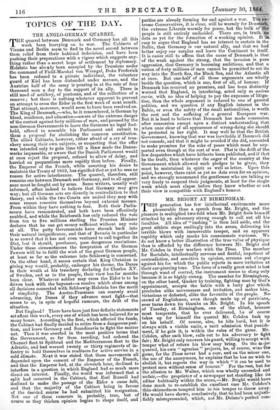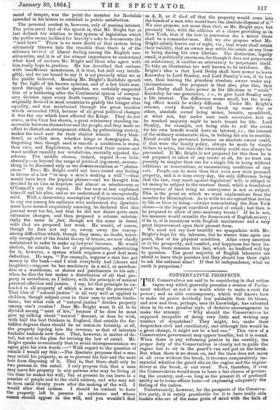Bland of temper, was the point the member for Rochdale
intended in his letters to establish to public satisfaction.
bidden e there should be no intestate heirship at all, the property lapsing into the revenue, as that of intestate bachelor bastards now does. That, however, is matter of de- tail, but not so the plan for revising the law of entail. Mr. Bright speaks so succinctly that to avoid misrepresentation we again give his own words :—" With regard to the question of entails I would say this :—The Spectator proposes that a man mey entail his property, so as to prevent his heir and the next heir from disposing of it. That is, that there shall only be two persons in the entail. I only propose this, that a man may leave his property to any persons who may be living at the time he makes his will; but at present he can leave to a ntimber,of people and to the child unborn and who may not be born until twenty years after the making of the will. I would alter that system. I should be content to have the property left to persons in existence and whose name should appear in the will, and you wouldn't find as A, B, or C died off that the property would come into the hands of a man who would have the absolute disposal of it." We also propose, not more than that, as Mr. Bright says, but precisely that, with the addition of a clause providing as in New York, that if the heir in possession die a minor there shall be a remainder-man. But we also propose what Mr. Bright calmly leaves out of sight, viz., that trusts shall retain their validity, that an owner may settle his estate on any lives in being during his own lifetime. The distinction, legally small, is politically enormous, for though it does not perpetuate an aristocracy, it enables an aristocracy to perpetuate itself. To take an illustration too well known to be invidious. Mr. Bright's idea is that Lord Derby shall have power to leave Knowsley to Lord Stanley, and Lord Stanley's son, if he has one, thus leaving the grandson absolute owner under any circumstances. Our proposal is that also, plus this, that Lord Derby shall have power in his life-time to " settle" Knowsley for one generation, 1. e., to give Lord Stanley only a life interest. The difference seems small, but the work- ing effect would be widely different. Under Mr. Bright's scheme, every family would break up some day or other, absolute owner being minor, lunatic, spendthrift, or what not, but under ours each successive heir as he reached majority ?night be made tenant for life. Lord Stanley, for example not being able to sell the estate for his own benefit would have an interest, i.e., the interest of the ordinary aristocratic idea, in bribing his son to resettle. Entail would be prevented because an absolute owner could, if that were the family policy, always be made by simple failure to settle' but then the ownership could also al ways be prevented. If Mr. Bright is not prepared for this then he is not prepared to allow of any trusts at all, for no trust can possibly be simpler than one for a single life in being without additions or reservations, or encumbering conditions of any sort. People can do more than that even now with personal property, and it is done every day, the only difference being that the law, very much against legislators' will, is obliged to let money be subject to the trustees' fraud, while a fraudulent conveyance of laud being no conveyance is not so subject. This is the point on which we want explanations from the member for Birmingham. As to wills we are agreed that devise to life or lives in being—always remembering the New York clause—is the longest expedient period of entail; but then is he prepared to allow of ante-mortuary trusts ? If he is not, his measure would crumble the framework of English society ; if he is, it is consistent with English institutions and a very great improvement upon their present form. We need not say how heartily we sympathize with Mr. Bright's hope for the labourer, but he wastes time upon one point, that of his physical condition. After every assertion as to his prosperity, and comfort, and happiness has been lis- tened to, there remains this fact, which no landlord will try to question. The great majority of English labourers are afraid to leave their parishes lest they should lose their right to ask the national alms I If that be independence, what on earth is pauperism ?































 Previous page
Previous page